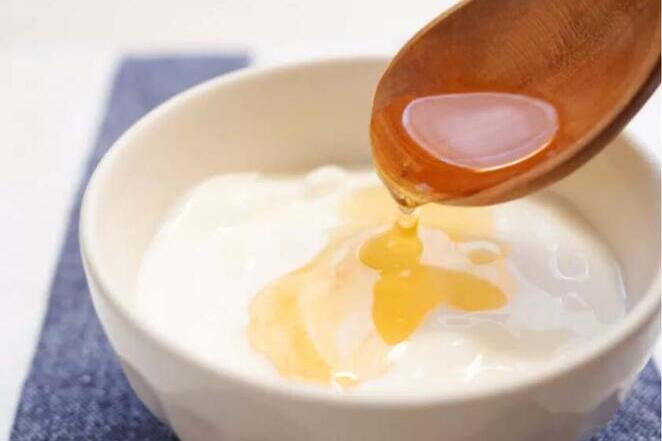Scientists Reveal 'One Tablespoon' Yogurt Addition For Probiotic Boost

For those with a sweet tooth, adding honey to your yogurt may not only satisfy your cravings but also boost your gut health.
Researchers from the University of Illinois have found that adding a tablespoon per serving (170g) has probiotic benefits.
A dollop of natural sweetness can support the survival of Bifidobacterium animalis (B. animalis), a healthy bacteria that grows well in dairy products.
Two studies—one simulated via petri dishes, and another with healthy adult participants—found that some varieties of honey promote the survival of this bacteria in the gut.
The combination of Greek yogurt and honey specifically is a common feature of the ever-popular Mediterranean diet.
"We were interested in the culinary pairing of yogurt and honey, which is common in the Mediterranean diet, and how it impacts the gastrointestinal microbiome," said Hannah Holscher, Associate Professor at The University of Illinois, in a statement.
Probiotics are live microorganisms, typically bacteria or yeasts, that provide health benefits when consumed in adequate amounts.
They are often referred to as "good" or "friendly" bacteria because they help maintain a healthy balance of gut flora, which is crucial for overall health.
Initially, four varieties of yogurt—alfalfa, buckwheat, clover, and orange blossom—supplied by the National Honey Board, who funded the studies, were initially tested in vitro.
Following oral, gastric, and intestinal digestion simulations, a decision was made to proceed with an extra experiment on 66 adult participants.
In order to gauge the potential benefits, each participant was tasked with consuming two different items for two weeks each—yogurt with clover honey and pasteurized, heat-treated yogurt.
North and South Dakota-produced clover honey was found to be particularly effective in two rounds of tests.
Subsequently, a decision was made for the human trial focused solely on this additive. Participant wellbeing, stool samples, and digestion were also monitored.
A graphic illustration depicting healthy gut bacteria. North and South Dakota-produced clover honey particularly helped probiotics survive the intestinal digestion phase better than sugar or water. Getty Images
"The enzymes in our mouth, stomach, and intestines help with digestion and facilitate nutrient absorption, but they also reduce the viability of microbes. That's great when it's pathogens but not necessarily when it comes to beneficial bacteria," Holscher said.
"We wanted to see if honey could help probiotic bacteria survive in the gut."
Honey with yogurt supported probiotic enrichment in the intenstine; however, the enrichment did not result in any gastrointestinal, cognitive, or mood improvements.
The researchers produced a smaller follow-up experiment involving 36 participants who consumed third food item, yogurt with sugar, to see if sweetness held the keys to the upkeep of B. animalis.
Despite sugar remaining a constant, they found that yogurt with honey preserved the most probiotics by some stretch.
A selection of fermented foods—cucumber pickles, coconut milk yogurt, kimchi, sauerkraut, red beets, apple cider vinegar—that are proven sources of healthy bacteria. The Mediterranean diet promotes fermented dairy elements as a staple. Getty Images
The results of this experiment are largely positive for those looking for a boost to their probiotic intake, without sacrificing taste.
Like yogurt, other effective ways of upping your probiotics intake include fermented foods and beverages like kefir, saurkraut, miso, kombucha, and kimchi.
Health-conscious types that remain lukewarm on the idea of consuming large volumes of sour, tangy notes are turning to the supplements market, estimated to be worth 57.80 billion USD in 2022.
It's important to note that over-indulging in honey would reverse the health benefits of this meal due to over-consumption of sugar, albeit a natural one.
"We have to keep in mind that honey is an added sugar, and most Americans need to be cognizant of the amount of sugar in their diet to maintain a healthy body weight," said Holcher.
"But adding a little bit of honey to unsweetened yogurt is a nice culinary pairing to incorporate into your menu rotation."
References
Alvarado, D. A., Ibarra-Sánchez, L. A., Mysonhimer, A. R., Khan, T. A., Cao, R., Miller, M. J., & Holscher, H. D. (2024). Honey varietals differentially impact Bifidobacterium animalis ssp lactis survivability in yogurt through simulated in vitro digestion. Journal of Nutrition, 154(3), 866–874. https://doi.org/10.1016/j.tjnut.2024.01.010
Mysonhimer, A. R., Brown, M. D., Alvarado, D. A., Cornman, E., Esmail, M., Abdiel, T., Gutierrez, K., Vasquez, J., Cannavale, C. N., Miller, M. J., Khan, N. A., & Holscher, H. D. (2024). Honey Added to Yogurt with Bifidobacterium animalis subsp. lactis DN-173 010/CNCM I-2494 Supports Probiotic Enrichment but Does Not Reduce Intestinal Transit Time in Healthy Adults: A Randomized, Controlled, Crossover Trial. Journal of Nutrition. https://doi.org/10.1016/j.tjnut.2024.05.028